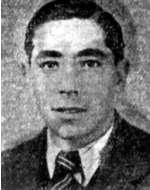Shabtai, son of Bracha-Benvenida and Yitzhak, was born on the 20th of Heshvan 5627 (20.10.1926) in the city of Salonika in Greece. Grew up in his city, attended elementary school. Some 80,000 Jews lived in Greece on the eve of World War II. The city of Salonika was a large Jewish cultural center, and its Jewish inhabitants played a central role in its economic development. In the 1930s, fascist and anti-Jewish tendencies intensified in Greece and a great movement began. Close to 10,000 Jews emigrated from Salonika to Eretz Israel, and another 50,000 Jews remained. Was not occupied by the Germans in May 1941 after a heavy air attack, and was divided into three zones of occupation – the Italian, the German and the Bulgarian. The Jews of Greece suffered from heavy hunger and many died of disease and exhaustion. The young people were taken to labor camps, and the Jewish community was forced to pay ransom for them. In February 1943, the Nuremberg Laws were implemented and the Jews were isolated in three main ghettos in Salonika and its vicinity. The extermination of the Jews of Greece took place in several stages: in March 1943 the deportation from Thrace and Macedonia, and the expulsion from Salonika and the surrounding area. Following the surrender of Italy and the German takeover in the summer of 1944, the Jews were expelled from the rest of Greece. About 54,000 Jews were sent to Auschwitz and exterminated by gas or sent to forced labor and died from starvation, disease and cruelty guards. Many of the Greek people helped the Jews hide in the mountains or escape, but few Jews survived. By the end of the war more than 80 percent of the Jews of Greece had perished, about 67,000. When the Nazis invaded Greece, Shabtai’s family was deported to Germany. He managed to escape on the way, hid in a village in Greece and lived there until the end of the war, working as a shepherd. The rest of the family went to a concentration camp where they were murdered. In 1945, as soon as the war ended, Shabtai immigrated to Israel. For a while he lived and worked on Kibbutz Ayelet Hashahar, then moved to Haifa, where he had relatives, and worked in various jobs. He was also active in the Hapoel Association in the city, especially as a soccer player. Shortly after arriving in Haifa, Shabtai joined the Haganah. At the outbreak of the War of Independence, he joined the army, and after a while joined the Engineering Corps and was sent to sabotage. Shabtai participated in the battles for Haifa and its liberation, fought in the difficult systems in Wadi Rushmiya, Ein Ghazal and Ein Hud. Later he was transferred to the Galilee. During his service he was promoted to sergeant. During the war Shabtai met Judith, and in September 1948 the two married. On October 17, 1948, at 15:00, when Shabtai was engaged in the dismantling of mines in Tel el-Hanisir in the Galilee (also called Givat Ham, over the Hula Valley), a mine exploded in his hand and he was killed. Twenty-two years old. He left a wife. He was laid to rest at the military cemetery in Rosh Pina. “One of the first defenders of Lower Haifa, one of the first defenders of Haifa, was a talented and courageous man who volunteered … one of the Galilee ‘s leading terrorists … no one who did not know him and did not admire his courage .. The survivors of the Holocaust are survivors who survived the last remnant of their nuclear family (parents, brothers, sisters, sons and daughters) who experienced the Holocaust in the ghettos and / or concentration camps and / or in hiding and hiding in territories occupied by the Nazis and / Or in combat alongside members of the underground movements or partisans in the Nazi-occupied territories who immigrated to Israel during or after World War II, wore uniforms and fell in the Israeli army.
